The term "semantic data management" is particularly relevant in the areas of big data and smart data, artificial intelligence and digital transformation. It refers to methods and technologies that make it possible not only to store large volumes of data, but also to structure and link them in such a way that computers can understand their meaning.
Semantic data management enriches information with additional information, so-called metadata. This allows correlations between different data sets to be recognised and used. This makes it easier for companies to extract knowledge from their data and make better decisions.
One example: In a company, customer data, product information and order histories are often stored separately. Semantic data management allows this information to be linked together. If a customer places a specific order, the system can automatically recommend suitable additional products because it understands the relationships between different products and customers.
Overall, semantic data management makes handling data more efficient, saves time during research and opens up new possibilities for automating and optimising business processes.















